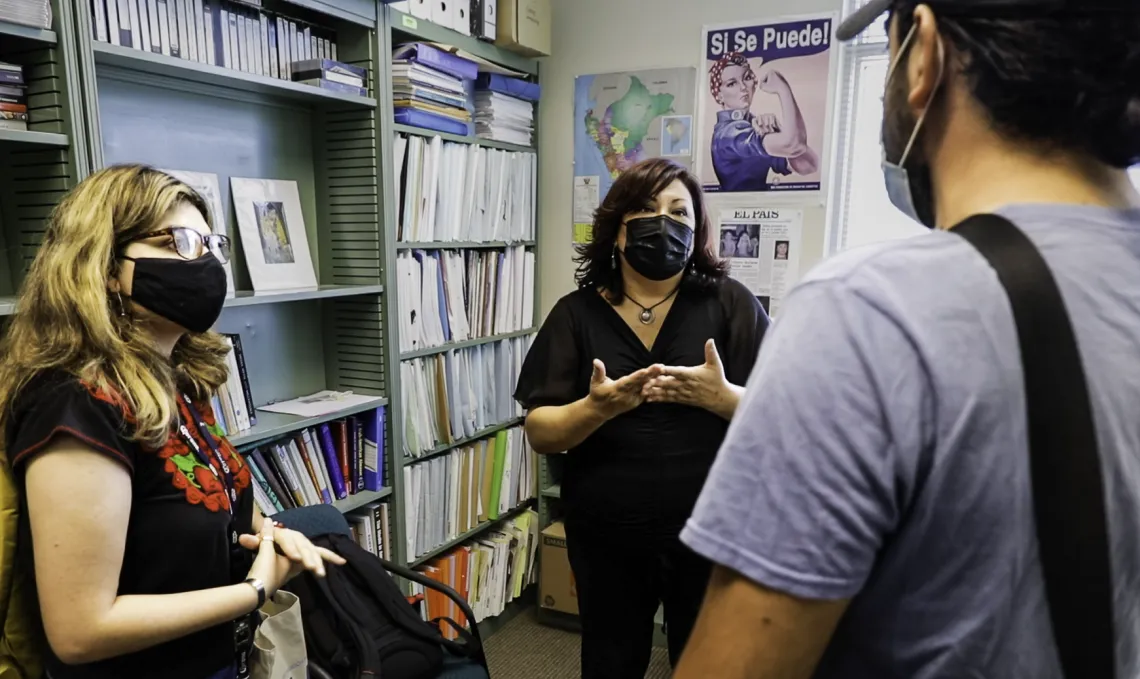Meet the First Cohort of Bilingual Journalism Master's Students (Video)

Jessica Retis (center) with students.
A new video, produced by Leslie Epperson, spotlights the master’s degree in Bilingual Journalism and its first cohort of students.
“This is about building a dialogue,” said Jessica Retis, journalism professor and director of the Bilingual Journalism Program. “Instead of doing a Spanish-language program, we decided to do a bilingual program. The idea is if we can communicate our stories – whether it’s in English or in Spanish – it will be for the benefit of the society.”
Retis is an experienced journalism educator and researcher. “Recent reports have shown over and over the lack of coverage of Latinos in mainstream media, but when they do appear on news, they are mostly related to stereotypes or conflict issues,” she said.
“What we want to do in the Bilingual Journalism Program is really encourage our journalists to think with that multicultural awareness,” added Ruxandra Guidi, assistant director of the program, assistant professor of practice, and independent journalist.
The students working toward their master’s degrees in Bilingual Journalism come from a variety of backgrounds.
Paula Diaz is from Colombia and works for Telemundo and Univision, Arizona. “Con este master siento que podemos estar en contacto con la comunidad y hacer historias de una manera mas profunda,” Diaz said. [Translation: “With this master’s I feel that we can be in contact with the community and make stories in a more profound way.”
Julia Blumberg teaches Spanish at the University of Arizona and is also getting her master’s in Latin American Studies. Because she has more of an academic than a journalistic background, “everything is new,” she said.
Blumberg wants to shine a light on what is happening on the border. “I just want to make society more aware of how the migrants are being treated and that they are people just like us, and should be treated as such,” she said.
Vanessa Lucero, whose ethnic heritage is Ecuadorian, is a reporter with the Daily Wildcat and is interested in working in a variety of journalistic mediums. ‘I definitely look forward to working on a project and getting to know all the professionals out there and learning from them,” she said.
Ashley Nicole Morales received her bachelor’s degree in psychology and works as a behavioral technician at Hopebridge Autism Therapy Center. She said sometimes working full-time and going to school full-time can be “a lot,” and she appreciates all the support she’s received.
“Dr. Retis and Rux are amazing,” Morales said. “Dr. Retis said, ‘Believe in yourself because I believe in you.’”
Mar Erisnelida Ruiz Barraza, an instructional aide at PPEL Tec High School Celestino Fernandez Learning Center, grew up in the small border city of San Luis, Ariz., where most of the income comes from agricultural work.
“I think it's very important that our border cities in our communities understand what's going on across the country,” she said. “Because if you don't show them and tell them in language that they understand, they will never know the importance of it.”
In the master’s program, students will acquire a robust set of skills in both Spanish and English that will translate into a significant competitive edge in the workplace. The program is one of the only fully bilingual programs in the country.
“We really want to be a part of fostering and encouraging these journalists beyond the border and across cultures and languages to see how they can be a part of creating the media of the future,” said Guidi.
“The main goal of journalism is looking for the truth,” Retis said. “I think that we need to start in the classrooms so we can make an impact in the newsrooms.”

